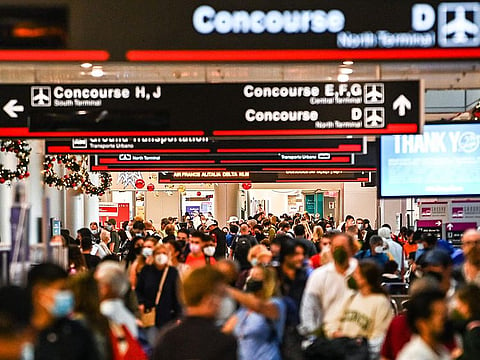US sets new global daily record of over 1 million COVID-19 cases
Surging infections leads to cancelled flights, closed schools and offices

Washington: The United States reported more than one million new COVID-19 cases on Monday after the long New Year’s weekend, according to data from Johns Hopkins University, as the Omicron variant spread at a blistering pace.
There were 1,080,211 new cases in the country, a global record, although the number of cases reported on a Monday is usually higher than other days because of delays in weekend tallying, especially after such a three-day holiday weekend.
Still, the figure is double the number of daily cases compared to the previous Monday.
The rolling average over seven days - which experts see as more reliable - was 486,000 cases per day as of Monday evening, the university said.
The new figure comes a day after top US pandemic advisor Anthony Fauci said the country was experiencing “almost a vertical increase” in Covid-19 cases, adding the peak may be only weeks away.
The heavily mutated Omicron strain - the most transmissible to date - accounted for around 59 percent of US cases in the week ending December 25, according to government modeling.
Fauci said the experience of South Africa - where the strain was first detected in late November and peaked quickly, then subsided nearly as speedily - offered some hope.
Rates of death and hospitalization in the United States have been lower in recent weeks than during previous Covid surges.
With 9,382 deaths over the past seven days, the nation’s death toll has fallen by 10 percent, week on week.
In the last seven days, the country has recorded 3.4 million cases according to Johns Hopkins data.
The US record during previous waves was 258,000 cases per day, for the week of January 5 to 11, 2021.
Officials have struggled to find a balance that will protect public health without gravely damaging the economy or slamming key services like policing and air travel.
Pfizer shot for kids as young as 12
Last week, the US Centers for Disease Control and Prevention halved the isolation period for asymptomatic COVID cases to five days, in a bid to blunt mass Omicron-induced disruption as infections hit new highs in multiple states.
And on Monday, the US Food and Drug Administration approved Pfizer’s Covid-19 booster shot for children as young as 12 ahead of the reopening of schools following the holiday break.
COVID-19 has killed at least 5,441,446 people globally since the outbreak emerged in December 2019, according to an AFP tally compiled from official sources on Monday.
Taking into account excess mortality linked to COVID-19, the World Health Organization estimates the overall death toll could be two to three times higher.
Booster after 5 months
Also the CDC recommended that people get a booster shot with the Pfizer Inc.-BioNTech SE vaccine five months after their first two shots, shortening the interval from the previous six-month regimen.
The new recommendation comes one day after the US Food and Drug Administration changed its emergency authorization for the shot to reflect a shorter dosing interval for the booster.
“Following the FDA’s authorizations, today’s recommendations ensure people are able to get a boost of protection in the face of omicron and increasing cases across the country,” CDC director Rochelle Walensky said in a statement.
The surging infections have led to cancelled flights, closed schools and offices, overwhelmed hospitals and strangled supply chains.
The data from Johns Hopkins University is complete as of midnight eastern time in Baltimore, and delays in reporting over the holidays may have played a role in the rising rates.
Some school systems around the US extended their holiday break Monday or switched back to online instruction, while others pressed ahead with in-person classes.
Caught between pleas from teachers fearful of infection and parents who want their children in class, school districts in cities such as New York, Milwaukee, Chicago, Detroit and beyond found themselves in a difficult position midway through the academic year because of the super-contagious omicron variant.
New York City, home of the nation’s largest school system, reopened classrooms to roughly 1 million students with a stockpile of take-home COVID-19 test kits and plans to double the number of random tests done in schools.
“We are going to keep our schools open and ensure that our children are in a safe environment,’’ newly sworn-in Mayor Eric Adams said.
New Yorker Trisha White said that she feels the risk is the same for her 9-year-old son in or out of school and that being with classmates is far better for him than remote learning.
“He could get the virus outside of school,’’ she said as she dropped the boy off. “So what can you do? You know, I wouldn’t blame the school system. They’re trying their best.’’
While the teachers union had asked the mayor to postpone in-person learning for a week, city officials have long said that mask requirements, testing and other safety measures mean that children are safe in school. The city also has a vaccination mandate for employees.
New cases of COVID-19 in the city shot up from a daily average of about 17,000 in the week before the holidays to nearly 37,000 last week.
Sign up for the Daily Briefing
Get the latest news and updates straight to your inbox


